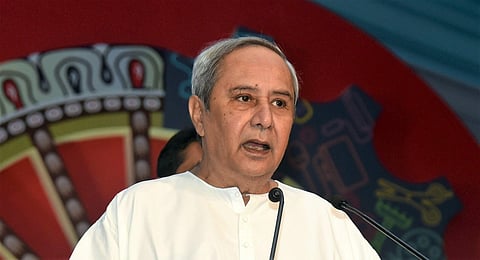

Odisha, a state averred by many as one of the poorest in the country, has set an example for the nation, be it by becoming the first city in the country to achieve clean drinking water from the tap in the city of Puri under its “Drink from Tap Mission” or the very recent success in achieving 100% vaccination coverage against Covid-19 in Bhubaneshwar along with administering the first dose of the jab to one lakh migrant workers, squatters and beggars in the capital city.
In addition to these, Odisha has now garnered a lot of appreciation from across the country and the diaspora for the Indian men and women hockey teams’ sterling performances at the Tokyo Olympics, with the former winning a medal after more than 40 years. It is the first state in the country that has officially sponsored both the teams since 2018 and has so far invested around Rs 150 crore for training purposes by providing infrastructure, adequate facilities, organising tournaments, etc. It is, in fact, in the process of building India’s largest hockey stadium in Sundergarh, a district that has produced some of the most famous hockey players of the country. Furthermore, every block in this district will soon have astro-turfs to acclimatise sportspersons to the playing conditions. What is even more laudable is the fact that when the national government or big corporates counted among the top Fortune 500 companies of the world failed to sponsor them, Naveen Patnaik, heading a state government, stepped in.
The government led by the current chief minister came to power in the state in 1999 after the devastating effects of the super cyclone that had ravaged Odisha. The newly elected government rose to the occasion and thus began the transformation of Odisha to where it stands today. It is now known as the leader in natural disaster management by virtue of its immaculate preparedness and mitigation measures.
Contrary to the quintessential persona of politicians, the Odisha CM has been a silent and quiet performer. He has taken efforts to ensure a welfare state, be it via the rollout of the KALIA scheme for farmers, being vocal for adequate women representation in governing bodies, and organising and empowering women self-help groups. Odisha, once the ‘disaster capital’ of the country, has now got two coastal villages recognised as being ‘tsunami ready’ by UNESCO, making us the first country in the Indian Ocean region to demonstrate such high levels of disaster preparedness at the community level.
The CM’s action of distributing approximately 19,000 MT of liquid medical oxygen to 19 oxygen-deficit states when the country was facing a huge crisis during the second wave of Covid-19 has been applauded for the display of the true spirit of cooperative federalism. Some other standout achievements of the state include providing loans to landless farmers via the new institutional mechanism of a joint liability group, providing an assurance-based (as opposed to insurance-based) universal health coverage with special emphasis on women via the Biju Swasthya Kalyan Yojana, starting Adarsh Vidyalayas to foster education and announcing special packages for particularly vulnerable tribal groups in the state, to name a few.
Achievement orientation comes when basic needs are met: Renowned psychologist Abraham Maslow was the propagator of the ‘hierarchy of needs’ model wherein human requirements were ranked starting from the very basic ones of food, clothing and shelter to meeting higher-order aspirational and self-actualisation needs. The Odisha government ensured that the basic needs of its people were taken care of through a plethora of socio-economic welfare schemes. This led to enhancement in their capabilities and instilled in them the desire to move up the ‘hierarchy of needs’ ladder by looking for newer opportunities and aspiring to achieve them. The focus on achieving higher-order aspirations is slowly but certainly helping to unleash the true potential of the state and its people. Odisha’s growth is also woven around skilling its people. This was recognised by the Europe India Foundation for Excellence as “Best State in Rural Skill Development” in 2019. The education and health sectors are also undergoing rapid transformation in the state. The larger plan is to make Odisha the education and health hub of the country.
How did Odisha achieve this feat? Governance in the state has been characterised by a 5T framework (an expanded version of the previously used 3T framework): technology and leveraging it, transparency in governance, team work from the various stakeholders involved and meeting targets in a time-bound manner, thereby leading to transformation. This nuanced approach of the government is the reason for the various accolades the state has garnered so far. The CM has not only catered to the basic needs via the Odisha Food Security scheme (SFSS) and Biju Pucca Ghar Yojana, but has gone miles ahead in making it an aspirational state despite its limited resources. Once a beleaguered backward region, it now boasts of effective governance in partnership with panchayati raj institutions and uses a community-based response strategy towards combating crises ranging from natural disasters to health emergencies such as the ongoing Covid-19 pandemic. What stands apart in all these initiatives is the involvement of the people to achieve community-level resilience and capacity to steer development.
The appreciation for Naveen’s governance today, even by his most vehement critics, is a recognition of the fact that the CM will be long acknowledged as the premier leader in the making of modern Odisha. India must learn from the state on how to make the most of its available resources and dare to achieve the impossible.
(Views are personal)
Amar Patnaik
BJD Rajya Sabha MP, ex-CAG bureaucrat with a PhD in management and now an advocate
(amar_patnaik @yahoo.com)